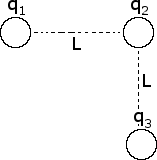Electric Flux
Given the 3 dimensional electric field, = 200 + 300 + 400 , and an area vector = 0.2 m + 0.3 m , find the electric flux. (this is a calculus based physics problem)
Related Problems
Two objects, whose charges are +3 nC and -2 nC, are separated by 1.0 mm. Find the magnitude of the attractive force that either charge exerts on the other.
In the figure below, L = 1.0 mm, q = +3 nC, q = -2 nC, and q is +4 nC. Find the magnitude and direction of the net electrostatic force on q

Below is a figure depicting a uniform electric field, E = 400 N/C at an angle = 40 above the horizontal. The red line represents a rectangle, going into the page, with area, A = 0.20 m. Find the electric flux through the rectangle.

A uniformly charged sphere has a radius of 40 cm and a total charge of 80 nC spread throughout its volume. If the following sections were removed from the sphere, how much charge would they contain?
A. A Spherical section with a radius of 10 cm
B. A cubical section with sides of 5.0 cm
C. A cylindrical section with radius 8.0 cm and length 15 cm